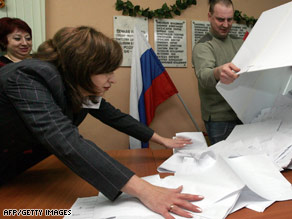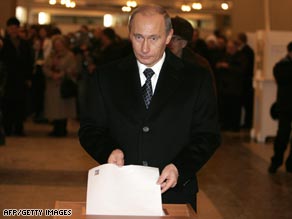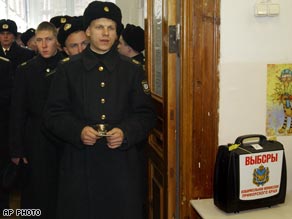MOSCOW, Russia (CNN) -- President Vladimir Putin's party claimed a sweeping mandate in Russia's parliamentary elections Sunday, winning nearly two-thirds of the vote in a contest that could let Putin wield power beyond the upcoming end of his presidential term.
With nearly 92 percent of precincts reporting, Putin's United Russia Party had 63.2 percent of the vote, according to the Central Election Commission. That margin would be enough to form a majority in the Duma, Russia's lower house of parliament, party leader Boris Gryzlov said at a news conference.
"The election is vindication that Vladimir Putin is the country's national leader, and that the Russian voters support the political course he has taken in the last eight years," Gryzlov said.
Three other parties are expected to hold seats in the new Duma. As of early Monday, the opposition Communist Party had received 11.7 percent of the vote; the nationalist Liberal Democratic Party, 8.4 percent; and the pro-Putin Fair Russian Party 8 percent.

Putin holds the top spot on United Russia's list of candidates, which guarantees him a seat in parliament. Sunday's showing by United Russia is likely to allow the president to extend his influence over Russian affairs when his presidential terms ends in 2008 -- perhaps as prime minister.
The Russian leader, whom critics accuse of undermining political and media freedoms while president, has said he would consider taking the post of prime minister if his party were to win a landslide victory. He has already held that office, in 1999, before then-President Boris Yeltsin named the former KGB officer Russia's acting president.

Putin was elected to succeed Yeltsin in 2000 and won a second term in 2004.
The remaining seven parties on the ballot, including several pro-Western liberal parties, failed to meet the 7 percent threshold for representation in the Duma.
But Communist Party leader Gennady Zyuganov told journalists that his party questioned the initial results, and said the party planned to conduct a vote count of its own. He said Communists would rally across the country for days in protest of what they believe is biased counting.

Independent election monitors say their work has been hampered, and reports abound of state employees being ordered to support the government.
In Washington, the White House called on Russian authorities to investigate complaints of election irregularities. U.S. officials had expressed concern ahead of the vote about the intimidation of opposition figures and the effect of "state-owned or -influenced" media in favor of Putin's party, National Security Council spokesman Gordon Johndroe said.
And opposition leader Garry Kasparov, the chess grand master who was sentenced to five days in jail for leading an unsanctioned demonstration in November, said Putin and his allies were "raping the democratic system."
"The campaign was completely dominated by all the authority that all belonged to United Russia," said Kasparov, whose Other Russia party was disqualified by election officials. "More or less, Russia now has moved to a soft version of one-party dictatorship."
But Kremlin spokesman Dmitri Peskov dismissed the complaints, arguing that even "marginal" parties had been allowed to take part in the campaign.
"What we faced here was a free and democratic election campaign," Peskov told CNN. "And the fact that we now, according to preliminary results, are expecting a three- or four-party parliament shows that this was really a race. The unique characteristic of that race was the leadership of one party, the front-runner, United Russia."
During the campaign, Putin described his opponents as "foreign-fed jackals" and said Russia would not tolerate meddling from abroad.
Far-right leader Vladimir Zhirinovsky, the leader of the Liberal Democratic Party, said he was satisfied with the initial results. He expected his party's share of the vote to rise as high as 13 percent once all the votes are counted.
And the leader of the Fair Russian Party, Sergei Mironov, said his party was planning to issue a bill in parliament to extend the presidential term. But changing the length of the presidential term would require a change to Russia's constitution, something Gryzlov said United Russia would not support